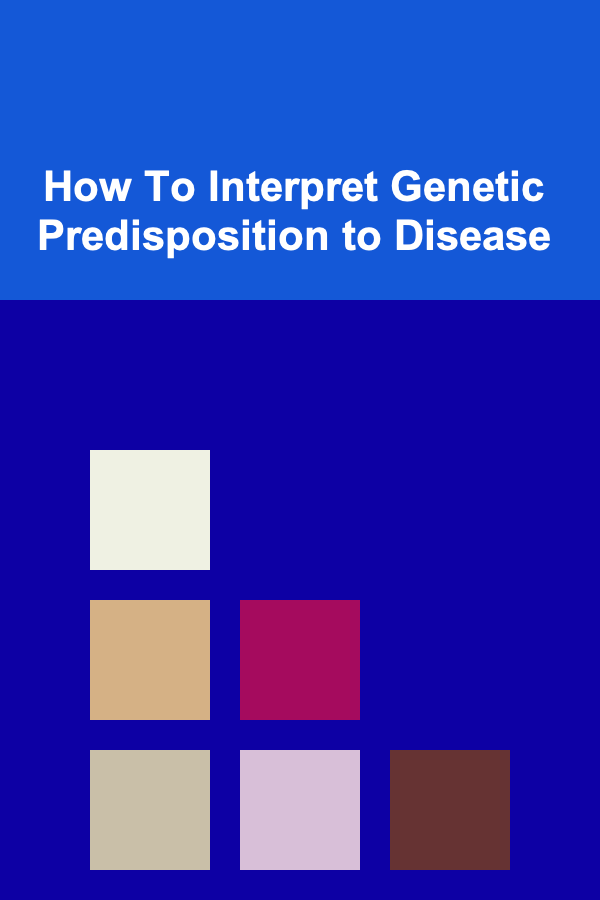
How To Interpret Genetic Predisposition to Disease
ebook include PDF & Audio bundle (Micro Guide)
$12.99$8.99
Limited Time Offer! Order within the next:

Genetic predisposition to disease is a complex and evolving concept that has profound implications for healthcare, lifestyle choices, and our understanding of human biology. This article delves into the meaning of genetic predisposition, how it influences the development of various diseases, the tools used to interpret genetic risk, and the potential impact of genetic knowledge on treatment and prevention strategies. We will explore the science behind genetic predisposition, current research, and the ethical and societal challenges of interpreting genetic information.
Understanding Genetic Predisposition
Genetic predisposition refers to an increased likelihood of developing a particular disease based on an individual's genetic makeup. Unlike inherited genetic disorders, where a person is guaranteed to develop a condition (e.g., cystic fibrosis or sickle cell anemia), genetic predisposition typically refers to a risk factor, meaning that it increases the chances but does not guarantee that the individual will develop the disease.
Genes and Disease Risk
Every person carries two copies of each gene---one from each parent. These genes carry instructions for building proteins that carry out various functions in the body. Mutations or variations in these genes can influence the risk of developing certain diseases.
Genetic predisposition comes from both common and rare variations in the genome. Common genetic variants can be found in a significant portion of the population and often have a small effect on disease risk. Rare genetic variants, on the other hand, are unique to individuals or families and can have a larger effect, sometimes leading to a higher likelihood of disease development.
How Genetic Predisposition Works
Genetic predisposition does not work in isolation. It is influenced by an interplay of genes and environmental factors, such as diet, physical activity, toxins, and infections. This interaction between genetic and environmental factors is crucial to understanding how predispositions manifest as diseases in real life.
In the case of certain conditions like breast cancer or heart disease, someone may carry genetic variations that increase their susceptibility. However, whether or not they develop the disease often depends on lifestyle factors, such as exercise, diet, smoking habits, and exposure to carcinogens. This makes genetic predisposition different from genetic determinism, where genetic factors alone are responsible for the development of a disease.
Genetic Testing: The First Step to Understanding Predisposition
To interpret genetic predisposition, genetic testing is often the first step. Over the past few decades, the field of genetic testing has advanced rapidly, making it possible to scan the entire human genome for specific genetic markers associated with various diseases.
Types of Genetic Testing
- Diagnostic Genetic Testing: This is used to confirm or rule out a specific genetic disorder in individuals who are showing symptoms or have a family history of the condition.
- Carrier Screening: This type of testing identifies individuals who carry a copy of a gene mutation for a recessive genetic disorder, like cystic fibrosis, even if they are not affected by the disease themselves.
- Predictive and Presymptomatic Testing: Predictive testing identifies genetic risk factors for a disease before the individual shows symptoms. Presymptomatic testing is used to detect genetic variants that can predict the onset of a disease in an individual who has a family history of it.
- Pharmacogenetic Testing: This type of testing provides insights into how an individual's genetic makeup affects their response to medications, potentially guiding more personalized treatment options.
The Role of Genome-Wide Association Studies (GWAS)
One of the most powerful tools for understanding genetic predisposition is Genome-Wide Association Studies (GWAS). These studies involve scanning the genomes of large populations to identify genetic variations associated with particular diseases. GWAS have uncovered many genetic variants linked to diseases such as diabetes, Alzheimer's, and various types of cancer.
However, these genetic variants usually account for only a small fraction of the risk. For example, in complex diseases like Alzheimer's or cardiovascular disease, a large number of common genetic variants may contribute to the disease risk, but each variant contributes only a tiny amount. This poses a challenge when interpreting genetic data, as a single genetic test is often not enough to predict disease outcomes with certainty.
Interpreting Genetic Data
Interpreting genetic testing results requires understanding both the technical and clinical aspects of the data. Geneticists and healthcare professionals must consider several factors when interpreting test results:
- Penetrance: This refers to the probability that individuals with a particular genetic variant will actually develop the associated disease. Some genes have high penetrance, meaning they are more likely to lead to the disease. Others may have low penetrance, making the development of the disease less predictable.
- Genetic Heterogeneity: Many diseases are influenced by multiple genes. For example, breast cancer can result from mutations in several different genes (BRCA1, BRCA2, and others). Interpreting genetic tests for such diseases requires considering the entire genetic profile rather than focusing on a single gene.
- Epistasis: This is the interaction between different genes that can influence the risk of disease. Sometimes, the effect of one gene variant may be modified by another gene variant. Understanding these interactions is crucial for accurate risk prediction.
- Environmental Factors: Genetic predisposition is just one piece of the puzzle. Lifestyle choices, environmental exposures, and other factors can either enhance or mitigate the effects of genetic risk factors.
The Challenge of Risk Prediction
Despite advances in genetic testing, predicting disease risk based on genetics alone remains challenging. For example, a person with a known genetic predisposition to a certain disease might never develop it, while someone without the genetic variant might still develop the disease due to other factors like lifestyle or environmental exposures.
This is particularly evident in diseases like cancer, where lifestyle choices such as smoking or diet play a significant role in disease development, potentially overshadowing genetic predisposition. While genetic testing can provide a clearer picture of disease risk, it cannot provide a definitive diagnosis or prediction of whether someone will develop the disease.
Genetic Predisposition and Disease Prevention
One of the key applications of genetic testing is its potential role in disease prevention. Knowing about genetic risks can empower individuals to make informed decisions about their health and well-being. For example:
- Cancer Prevention: For individuals with a family history of breast cancer and genetic mutations like BRCA1 and BRCA2, genetic testing can identify the risk of developing the disease. With this information, individuals might choose to undergo more frequent screenings (e.g., mammograms or MRIs) or even opt for preventative measures like prophylactic surgeries to reduce their risk.
- Cardiovascular Disease: Genetic tests can also reveal the presence of variants that increase the risk of heart disease, such as mutations in the LDLR gene, which is associated with familial hypercholesterolemia. With early knowledge of genetic risks, patients can adopt healthier diets, exercise regimens, and medications to prevent the onset of cardiovascular diseases.
- Personalized Medicine: Beyond disease prevention, genetic information is increasingly being used to tailor medical treatments to individual patients, a field known as personalized or precision medicine. By understanding an individual's genetic makeup, doctors can choose the most effective medications, adjust dosages, and avoid drugs that may cause adverse reactions.
Ethical and Societal Implications
As we gain deeper insights into genetic predisposition, there are significant ethical and societal questions that need to be addressed.
Genetic Privacy and Discrimination
With the rise of genetic testing, concerns about privacy and discrimination have emerged. Should individuals be required to disclose their genetic information to employers or insurance companies? Could genetic testing result in discrimination based on someone's predisposition to certain diseases, even if they never develop them?
The Genetic Information Non-Discrimination Act (GINA) in the United States prohibits discrimination based on genetic information in health insurance and employment. However, this law has limitations and does not protect individuals from discrimination in other areas, such as life insurance or disability insurance.
Psychological Impact
Receiving genetic information about one's predisposition to disease can have psychological consequences. For some individuals, knowing they have a high risk of a particular disease might lead to anxiety, depression, or a sense of helplessness. For others, it might lead to positive health changes, as they take proactive steps to reduce their risk.
Healthcare professionals play a critical role in counseling patients on the potential emotional and psychological effects of genetic testing, providing support and guidance as they navigate these challenges.
The Promise and Perils of Direct-to-Consumer Genetic Testing
In recent years, direct-to-consumer genetic testing companies like 23andMe and Ancestry.com have gained popularity, allowing individuals to access their genetic information without involving a healthcare professional. While these tests can provide valuable insights into ancestry and some health risks, they can also lead to misinterpretation of results, particularly when individuals do not have the expertise to understand the significance of genetic variants.
These tests are also often limited in scope, testing for only a handful of common genetic variants associated with certain conditions. This can give consumers a false sense of security or an exaggerated sense of risk. Therefore, it is important to approach direct-to-consumer genetic testing with caution and seek professional guidance for a comprehensive understanding of the results.
Conclusion
Interpreting genetic predisposition to disease is a multifaceted process that requires careful consideration of genetic, environmental, and lifestyle factors. Genetic testing can provide valuable insights into an individual's risk for certain diseases, but it is not a definitive predictor of whether or not they will develop those conditions. Understanding genetic predisposition is crucial for prevention and personalized treatment, but it also raises important ethical, societal, and psychological questions that need to be addressed.
As research advances and our ability to interpret genetic data improves, the hope is that we will move towards a future where genetic information can be used to prevent diseases and optimize treatment. However, it is essential that genetic testing is approached with caution, clear communication, and proper counseling to ensure that individuals can make informed, empowered decisions about their health.

How to Learn from Professional Cleaners: Tips and Techniques
Read More
How to Offer IT Support and Maintenance Services to Clients: An Actionable Guide
Read More
How to Prepare for Opening Your Time Capsule Years Later
Read More
How to Set Up a Checklist for Completing the Employee's Final Day Procedures
Read More
The Business Development Executive's Guide: Mastering Strategies for Growth and Client Acquisition
Read More
How To Deal with Different Financial Habits
Read MoreOther Products

How to Learn from Professional Cleaners: Tips and Techniques
Read More
How to Offer IT Support and Maintenance Services to Clients: An Actionable Guide
Read More
How to Prepare for Opening Your Time Capsule Years Later
Read More
How to Set Up a Checklist for Completing the Employee's Final Day Procedures
Read More
The Business Development Executive's Guide: Mastering Strategies for Growth and Client Acquisition
Read More